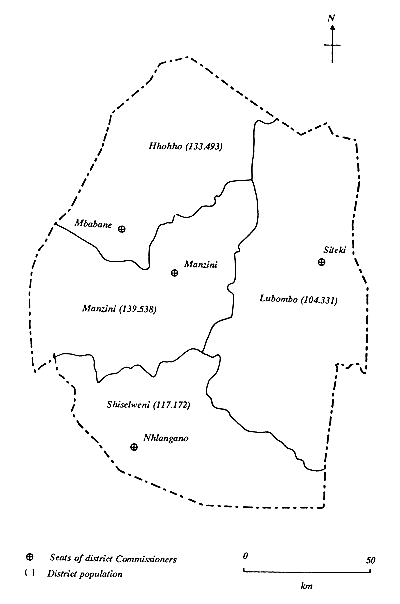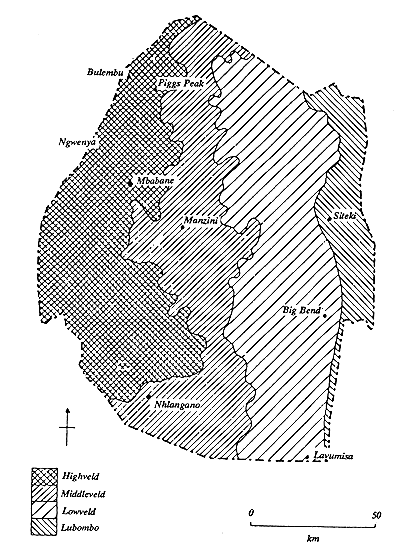The Project Group for Aquaculture Development, Ministry of Agriculture and Cooperatives, and the ALCOM Farming Systems Team, have completed the 1990–1991 study phase of the pilot project Rehabilitation of Homestead Ponds, Swaziland. The pilot project aims to increase the supply of protein and provide income - generating opportunities for rural communities through aquaculture. The study phase reported here documents and evaluates the current state of homestead fish farming and extension in Lubombo Region. It suggests improvements for implementation during the rehabiliation phase in Lubombo Region and the expansion phase throughout Swaziland.
A socio-economic survey was carried out of all 46 individual pond owners in Lubombo region and an equal sample of neighouring and distant (non-neighbouring) farmers. Detailed follow-up interviews were conducted with some farmers, and additional information on farming systems was gathered in the field and from secondary sources.
The survey shows that there is potential, in terms of resources available and current farming practices, to increase fish pond production on homestead ponds in the Lubombo region. The need for improved aquaculture practices and extension services is confirmed. Further analysis is needed to quantify these conclusions.
Those involved in aquaculture tend to be small-scale farmers who are agriculturally active and more oriented towards the sale of farm produce than in subsistence production. They also engage in other economic activities. Labour availability does not constrain farming practices. It is probable that the current group of practising fish farmers is that most likely to succeed at intensified fish farming in Lubombo region.
Supplies of key inputs for aquaculture are available from on-farm resources, although the amounts available may limit fish pond production. Some inputs such as fingerlings, and feed for intensive aquaculture systems, must be obtained off-farm.
The quality of fish pond construction (size, depth, dikes) varies but is generally deficient. In some areas there is not enough water to keep ponds full year around, or water supply for ponds is unreliable or difficult to obtain. The level of fish pond management is low and knowledge of fish farming practices is limited. Very few fish are being produced by fish ponds. There is a high level of interest among fish farmers to improve their fish farming practices to produce more fish. Thus there is scope to improve fish production by concentrating on fish farming practices adapted to existing farming systems.
There is strong demand for fish, which is consumed by homestead families regardless of whether fish farming is practised. There is scope for increasing fish production for local consumption by the fish farmer or for sale to neighbors, displacing fish purchased in stores. A marketing study is needed to determine the regional demand for fish and the potential for marketing larger pond surpluses in the future.
There are no social or cultural barriers to fish consumption. However, knowledge of fish preparation is limited and could be improved through extension.
The current extension services are insufficient to promote fish farming development. There are no fish farming messages adapted to the current farming practices. There is low participation in community organizations; as a result, these are unlikely vehicles for promoting fish farming on a wide scale, although they may be effective in certain areas such as small-holder sugar schemes. Extension services and messages need development in the context of improved fish farming practices.
Activities are proposed to improve fish farming practices and extension services, and further evaluate social and economic aspects:
Trials of clarias-tilapia polyculture by four selected farmers, two on the plateau and two in the lowveld, during the 1991–1992 growing season.
Trials of clarias-tilapia polyculture and carp monoculture by 30 selected farmers during the 1992–1993 growing season. There should be roughly 10 participants each from the plateau, northern lowveld (Vuvulane) and southern lowveld. These trials will test a range of stocking and feeding regimes and key socio-economic indicators will be monitored.
Practical training of the Fisheries Assistant Officer, Lubombo Region, in clarias culture techniques at a suitable site in the Southern African region, and in-country training of all Fisheries Section professional staff in clarias culture.
Provision of permanent transport for the Fisheries Assistant Officer, Lubombo Region, and implementation of an extension strategy which focuses on a limited group of motivated farmers during the rehabilitation phase.
Marketing study which describes opportunities and strategies for selling excess fish production among homesteads, in local market centres, and outside the Lubombo Region.
| Abstract | |
| This document, resulting from a 1990–1991 study, evaluates the current state of homestead fish farming and extension in Lubombo Region, Swaziland. It was carried out by the Project Group for Aquaculture Development, Ministry of Agriculture and Co-operatives, Swaziland, and the ALCOM Farming Systems Team. Under the study, a socio-economic survey was carried out of all 46 individual pond-owners in the Lubombo region and an equal sample of neighbouring and distant farmers. Detailed follow-up interviews were conducted with some farmers. The survey shows that potential exists to increase fish pond production on homestead ponds in the Lubombo region. But aquaculture practices and extension services need to be improved. | |

Figure 1. Administrative districts of Swaziland
(Goudie and Williams, 1983)
| WEST | EAST | ||
| HIGHVELD | MIDDLEVELD | LOWVELD | LUBOMBO |

Figure 2. Topographical regions of Swaziland
(Goudie and Williams, 1983)